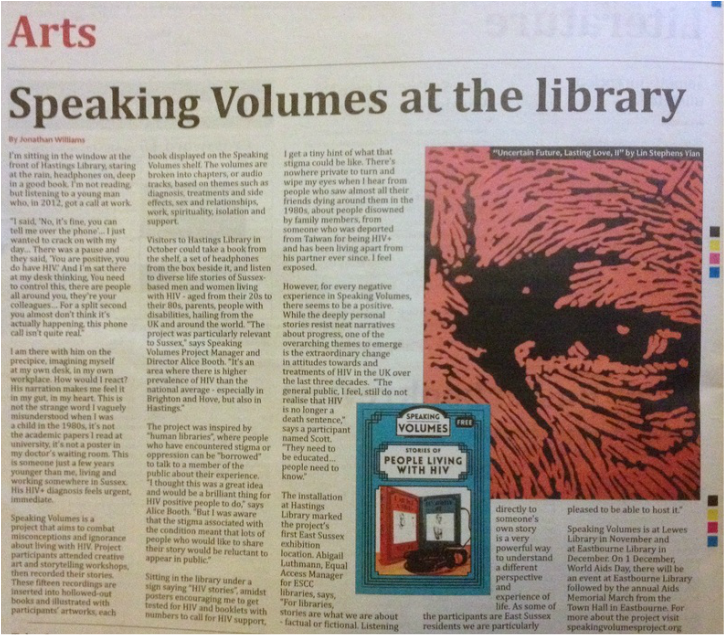| A couple of months ago, I posted a report about the Speaking Volumes exhibition at Hastings Library. That long article was intended for the 'community' section of Hastings Independent, but did not make it into the paper. I re-wrote the piece as a shorter, more personal review for the 'arts' section, where it appeared in the following edition. I'm always interested to see how people craft the same content into different formats (yeah, I'm a comms geek). Hopefully you're interested, too, or else this is an exercise in serious vanity posting! I wonder which version you prefer? |
“I said, ‘No, it’s fine, you can tell me over the phone’ . . . I just wanted to crack on with my day . . . There was a pause and they said, ‘You are positive, you do have HIV.’ And I’m sat there at my desk thinking, You need to control this, there are people all around you, they’re your colleagues . . . For a split second you almost don’t think it’s actually happening, this phone call isn’t quite real.”
I am there with him on the precipice, imagining myself at my own desk, in my own workplace. How would I react? His narration makes me feel it in my gut, in my heart. This is not the strange word I vaguely misunderstood when I was a child in the 1980s, it’s not the academic papers I read at university, it’s not a poster in my doctor’s waiting room. This is someone just a few years younger than me, living and working somewhere in Sussex. His HIV+ diagnosis feels urgent, immediate.
Speaking Volumes is a project that aims to combat misconceptions and ignorance about living with HIV. Project participants attended creative art and storytelling workshops, then recorded their stories. These fifteen recordings are inserted into hollowed-out books and illustrated with participants’ artworks, each book displayed on the Speaking Volumes shelf. The volumes are broken into chapters, or audio tracks, based on themes such as diagnosis, treatments and side effects, sex and relationships, work, spirituality, isolation and support.
Visitors to Hastings Library in October could take a book from the shelf, a set of headphones from the box beside it, and listen to diverse life stories of Sussex-based men and women living with HIV - aged from their 20s to their 80s, parents, people with disabilities, hailing from the UK and around the world. “The project was particularly relevant to Sussex,” says Speaking Volumes Project Manager and Director Alice Booth. “It's an area where there is higher prevalence of HIV than the national average - especially in Brighton and Hove, but also in Hastings.”
The project was inspired by human libraries, where people who have encountered stigma or oppression can be “borrowed” to talk to a member of the public about their experience. “I thought this was a great idea and would be a brilliant thing for HIV positive people to do,” says Alice Booth. “But I was aware that the stigma associated with the condition meant that lots of people who would like to share their story would be reluctant to appear in public.”
Sitting in the library under a sign saying “HIV stories”, amidst posters encouraging me to get tested for HIV and booklets with numbers to call for HIV support, I get a tiny hint of what that stigma could be like. There’s nowhere private to turn and wipe my eyes when I hear from people who saw almost all their friends dying around them in the 1980s, about people disowned by family members, from someone who was deported from Taiwan for being HIV+ and has been living apart from his partner ever since. I feel exposed.
However, for every negative experience in Speaking Volumes, there seems to be a positive. While the deeply personal stories resist neat narratives about progress, one of the overarching themes to emerge is the extraordinary change in attitudes towards and treatments of HIV in the UK over the last three decades. “The general public, I feel, still do not realise that HIV is no longer a death sentence,” says a participant named Scott. “They need to be educated . . . people need to know.”
The installation at Hastings Library marked the project’s first East Sussex exhibition location. Abigail Luthmann, Equal Access Manager for ESCC libraries, says, “For libraries, stories are what we are about - factual or fictional. Listening directly to someone’s own story is a very powerful way to understand a different perspective and experience of life. As some of the participants are East Sussex residents we are particularly pleased to be able to host it.”

 RSS Feed
RSS Feed
